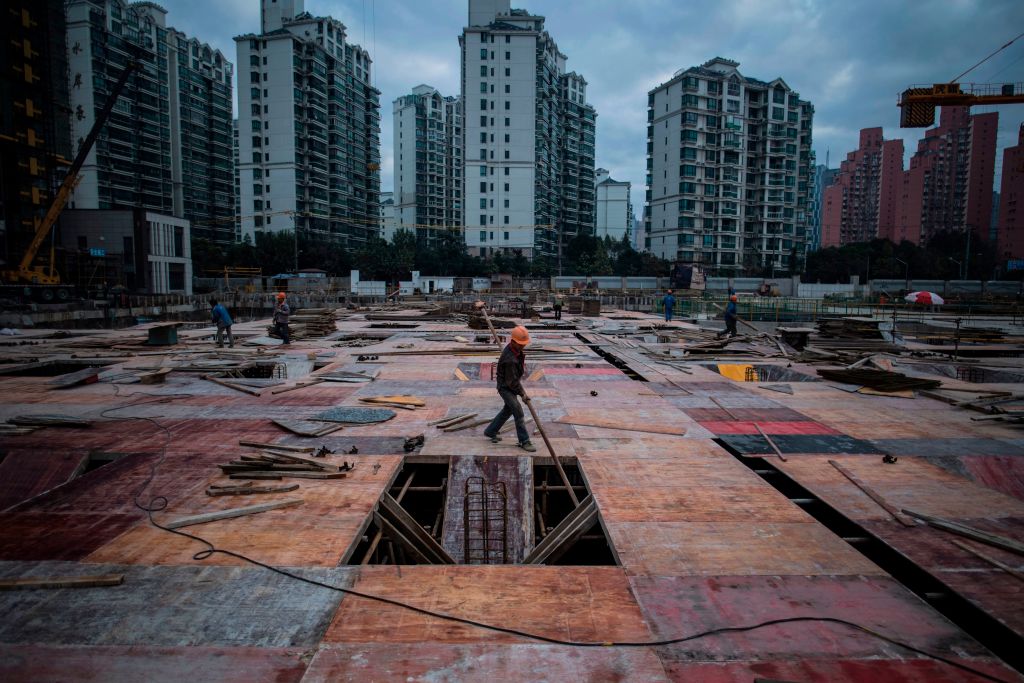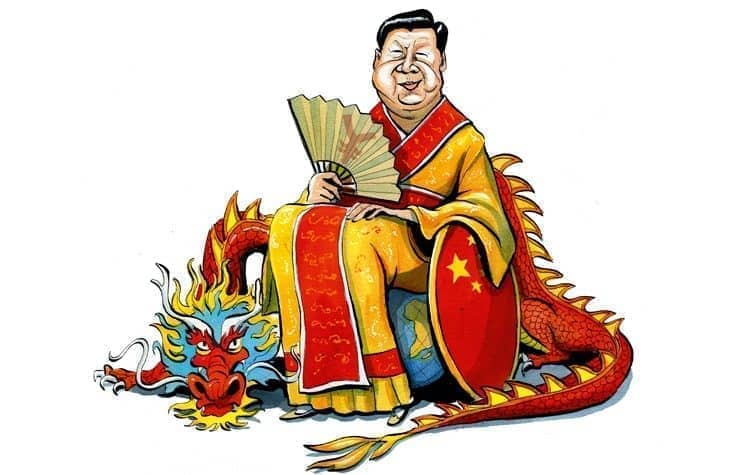The absence of Xi Jinping from COP26 in Glasgow this weekend should strip away any illusion that China is a serious partner on climate change. It also points to another intriguing possibility – that we may be witnessing not Peak Carbon, but Peak China. The Communist party may be facing the sort of decline it wishes on the West, and as with the climate, the impact could be dangerous and unpredictable.
By staying at home China’s leader can concentrate on what has become an urgent priority for his government: massively ramping up the production and import of coal to solve the energy crunch his increasingly unsustainable economy is facing. That might have been a bit of a conversation stopper around the dinner table in Scotland.
Old coal mines are being rapidly brought back into production and output ramped up at existing ones. China is scouring the globe for coal, and ships are queuing to drop if off at the country’s clogged ports.
Xi has stepped up sanctions-busting imports from North Korea, according to a UN panel of experts responsible for monitoring sanctions on the North on behalf of the Security Council. The panel obtained satellite images of Chinese coastguard vessels looking on while coal was transferred from North Korean vessels to Chinese-flagged ships. Beijing pressured the panel to place the photographs in a confidential annex of a report published in September, though the incident is described in the text.
China’s energy crisis is being described as the worst in a decade. Half of the country’s provinces are rationing electricity, factories have closed, and there are regular blackouts. There are a number of reasons for the crisis, including flooding in coal producing regions, but most can be traced to policy missteps. These range from an economic bounce-back after Covid that relied on energy-hungry construction and heavy industry, to self-defeating energy subsidies. Coal prices in China reached an all-time in October, more than doubling since the beginning of the year, before falling back on government intervention. In some cases power stations have cut output in order to avoid generating electricity at a loss. A cold winter will massively exacerbate the problem.
There are reports that China is once again bringing in coal from Australia, which would a humiliating climbdown after it banned Australian imports following Canberra’s call last year for an independent enquiry into the origins of the coronavirus.
Glasgow was always going to be tough for Xi. China is the world’s biggest polluter, responsible for 27 per cent of global emissions of greenhouse gases. It is opening new coal-fired power stations and increasing emissions at an annual rate that is greater than the savings of the rest of the world put together. Last year, coal plants with a combined capacity of 37.75 gigawatts were retired globally, more than half in the United States and European Union, according to an analysis by Global Energy Monitor, which studies fossil fuel trends. During that time, China opened 38.4 gigawatts of new plants – that’s three times more new coal fired capacity than the rest of the world combined. It is currently building new coal plants at more than 60 locations across the country
There is a realisation that Xi Jinping wants the souls of foreign investors and not just their money. He wants them to take sides
China has pledged that its greenhouse gas emissions will reach their highest point before 2030 and the country will reach carbon neutrality before 2060. It announced some cosmetic changes to that programme in the run-up to COP26, light on detail and heavy with caveats, leaving little doubt that Beijing is now prioritising its economy.
In the run-up to COP26, Xi said China would no longer finance coal-powered plants internationally. This was presented as a concession and eagerly embraced as such by the West, desperate for signs of Beijing’s cooperation. It was no such thing. Construction had already dried up because of the soaring price of coal and the fall in price of renewables, as well as concern over debt among the recipients of Beijing’s largesse.
China certainly talks the talk on clean energy and sustainability. It does generate more energy from solar power than any other country, and is seeking to corner the global market in many green technologies, but it remains addicted to coal. Fossil fuels still account for 85 per cent of energy used, and coal represents 57 per cent of that. It consumes as much coal as the rest of the world combined, and has given few details of how it intends to kick the habit – rendering its pledges meaningless.
Taken in isolation, China’s energy crunch would be challenge enough for the Communist party, but it comes at a time of multiple and growing problems. The bursting of the country’s property bubble continues apace. Evergrande, the world most indebted property company, teeters on the brink of bankruptcy, kept in a state of suspended animation by a Communist party terrified of the consequences of a crash. And the contagion is spreading, with other property companies unable to pay their debts. It is not just that property and property-related goods and service are a driver of growth, representing 28 per cent of the economy, it is that Evergrande is in many ways the Chinese economy in microcosm – a scary combination of eye-watering debt, lack of transparency and diminishing returns on wasteful investment.
Even if the Party manages to muddle through, bailing out and shuffling distressed assets on to state-owned banks and other pliable entities, the country could face years of relative economic stagnation.
It also comes at a time when the Party has taken aim at some of the country’s most dynamic companies, from Alibaba, the king of e-commerce, to private tutoring platforms. There are multiple reasons for this, but it essentially boils downs to the Party asserting greater control, particularly over data, and a further centralisation of power around Xi. Whether this is conducive to creating the sort of domestic-driven innovation economy China aspires to have must be doubtful – especially when it is increasingly cut off from the Western IP that is has so easily been able to steal, copy or otherwise acquire in the past.

Foreign investors in China are a stoic bunch. There have been times when it has seemed there was no end of abuse they were willing to take for a slice of the mythical China market. Some still suffer from a version of Stockholm Syndrome, where a hostage increasingly identifies with their captor. But there are signs of increasing unease, a realisation that Xi Jinping wants their soul and not just their money. He wants them to take sides. There are whispers that China is becoming increasingly uninvestable.
Hard-nosed financial types have rarely been squeamish. A million imprisoned Uighurs rarely gets in the way of a profitable Chinese investment. But profit is now more challenging and the Party is armed with a rash of new security, data and cyber laws empowering it to take out through the front door what it used to steal from the back. And Hong Kong is no longer immune. For those living in the former British colony, Communist Party repression has reached their doorstop. It was always a bolthole, a place of sanctuary from the harder edges of doing business in the mainland. Now ‘one-country two-systems’ is dead and the Party is rounding up critics as enthusiastically in Hong Kong as it does on the mainland. The best venues for Hong Kong leaving parties are reportedly booked up weeks in advance it.
Internationally, China is no longer having such an easy ride. There is increasingly alarm and growing pushback against Beijing’s bullying. The country’s ‘wolf warrior’ diplomacy is increasingly counterproductive. It is significant that while much of the publicity about the Aukus deal for Britain and America to provide nuclear-powered submarine technology to Australia centred on French outrage, it was quietly welcomed throughout the Indo-Pacific region. Other alliances, including the Quad grouping of India, the US, Australia and Japan, and the Five Eyes signals intelligence sharing alliance of the UK, US, Canada, New Zealand and Australia are being refreshed and repurposed with China in mind.
The belief that we need China’s cooperation on climate change and North Korea has given Beijing enormous leverage over the West. This was made explicit when China told John Kerry, American’s climate change ambassador, that the price for cooperation on climate is bilateral concessions in other areas. Beijing has shown that it cannot be trusted on carbon or Kim, which should diminish Xi’s ability to use them as leverage. America and other nations are looking for ways to wean themselves off their dependence on China’s monstrously large economy just as they have reduced the reliance on fossil fuels. It’s not quite ‘net zero China by 2050’ but there is real and justified anger among policy makers about the CCP’s lack of transparency as to the origins of Covid-19.
British policy remains muddled – recognising China as a ‘systemic competitor’ and criticising human rights abuses, while seeking deeper trade and investment links. Beijing does not hesitate to use investment as coercion. Ahead of October’s Global Investor Summit’ at the Science Museum last week, Boris Johnson said, ‘China is a gigantic part of our economic life and will be for a long time – for our lifetime’, and declared that he wasn’t about to ‘pitchfork’ away Chinese investment. In interviews at the time of the Aukus Pact (and during the deployment of the Queen Elizabeth carrier strike group to the Indo-Pacific), Johnson could barely bring himself to mention China. China’s leader became ‘Xi Who Cannot Be Named’.
Over the years there have been numerous predictions of doom and gloom for China’s economy, once described as the bubble that never pops. The combination of factors we are now seeing does feel different, but also dangerous. Peak China may fall back on increasingly strident nationalism – something we are already seeing. A gory chest-thumping Korean War movie, The Battle of Lake Changjin, commissioned by the Party’s propaganda department, has just broken all box-office records in China. It depicts the People Liberation Army’s ‘volunteers’ defeating the killing lots of villainous Americans in one of the major battles of the war. ‘Resist American aggression and aid Korea — protect your home and country!’ scream the brave volunteers as they scramble through the snow.







Comments